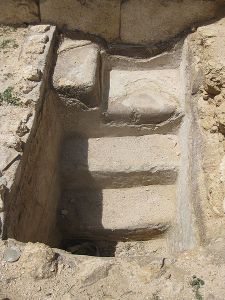“וכיבס המטהר את בגדיו וגלח את כל שערו ורחץ במים וטהרו”
“The One who shall be Cleansed shall wash his clothes, shave his hair and bathe himself and be Cleansed.”
(Leviticus 14:8)
This weeks and last weeks Portion of the Torah focused on the concept of Purity in Jewish Law. Unfortunately in the modern world we don’t have much of an idea of what ‘Purity’ means. Most people will be familiar with Christian concepts of Original Sin, which connects impurity to sexual acts and women. This could n’t be further from what Purity is in Judaism. The verse above uses the phrase; ‘he shall bathe himself’, the Rabbis took this mean bathe in a Mikveh, a ritual bath. On a Tour of ancient sites in Israel one can see many ritual baths, but what is their significance, how do they ‘purify’ a person?
Purity in Judaism
According to the Mishnah, the source of most Impurity is Death. Rabbi Soloveitchik in his work ‘Halachic Man’ explained that the source of impurity in death is the inability to carry out mitzvoth (Commandments), one cannot fulfil one’s purpose which is to serve the Holy One. Our purpose in this world is to connect to the Eternal through the application of Mitzvoth. Here are some examples of states of ‘impurity’:
1. When a woman gives birth she moves from a completely pure status of containing life within her to having that life removed from her. Even though this is not death, we understand that it is in fact the beginning of a life. However it is akin to death because for nine months there were in fact two lives in one body, now that there has been a birth the lady’s body undergoes a ‘change in status’. A life has been removed from her body so to speak. This is why it was explained in last weeks reading that a woman is impure for a certain period of time.
2. The Leprosy described in this weeks reading is a spiritual disease, with no connections to Hanson’s disease (what used to be called leprosy). This disease came about due to certain impure actions, one of which was malicious gossip. Malicious gossip was considered by the Rabbis to be akin to murder, some call it ‘character assassination’. The loss of reputation can be a form of death to many people and certainly impurifies the person who caused it.
Yet impurity itself is not a moral status rather an indicator of a spiritual status.
3. We would not normally say that a person who touches a vole or a lizard is an evil person, yet if a priest were to touch such a creature he would have to immerse himself in a ritual bath. He would do this, not because of an inherent evil in such things but because he came in contact with a forbidden animal, a creature that had no immediate connection with mitzvoth; they cannot be eaten and thus no blessing can be said over them. As there is no way of bringing such an action into divine service it becomes impure and the person must cleanse themselves.
In all the examples of impurity above their is a connection to either death or the inability to carry out a mitzvah, the examples of child birth and leprosy, are examples of contact with things ‘akin to death’ and the forbidden creature is an example of the loss of potential for the carrying out of mitzvoth.
What is a Mikveh ?
A Mikveh is a body of ‘living water’ 40 seahs deep. By a body we don’t just mean any man made ‘ritual bath’ but also oceans and streams. ‘Living water’ connotes water from a natural source. (40 seahs is about 144 eggs worth of water – 14.3 litres).
Living water is a symbol of Torah, of the Eternal’s teaching and of our connection to the divine. It makes sense that when a person changes their spiritual status that this can be rectified by this symbol of the Divine Law. In our time a mikveh is only used for conversion, women during their menstral cycle, for purifying utensils and for men who wish to connect with this symbolism.
This is an example of an ancient Mikveh from Herodion:
A connection with the Divine
The concept of Purity is a method of describing the person’s connection with the divine, it is not necessarily a description of moral sanction. The symbol of the Mikveh, the bath of ‘living water’ is a parable for the divine connection to the Jewish People.
As it says in the last chapter and clause in the Mishnah of Yoma:
‘אמר ר’ אקיבה: “אשריכם ישראל”, ואומר: “מקווה ישראל ה'”, מה מקווה מטהר את הטמאים אף הקדוש ברוך הוא מטהר את ישראל’
‘Rabbi Akiva said: ‘Happy are you Israel, and it is said; ‘God is the Mikveh of Israel’, Just as a mikveh purifies the impure so too The Holy One Blessed Be He purifies Israel.’

